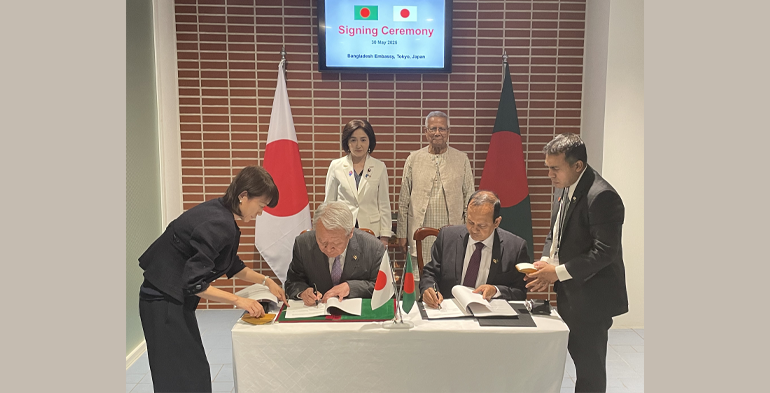
Loan and Grant Agreement signed in Tokyo; Chief Adviser Dr. Muhammad Yunus attends the ceremony
Agrilife24.com:To advance economic reforms, strengthen climate change resilience efforts as well as promote educational opportunities for government officials, the Japan International Cooperation Agency (JICA) and the Government of Bangladesh signed two major agreements in Tokyo, Japan, on May 30, 2025.
Dr. Tanaka Akihiko, President of Japan International Cooperation Agency (JICA) and H.E. Md. Daud Ali, Ambassador Extraordinary and Plenipotentiary of the Government of the People’s Republic of Bangladesh signed the Loan Agreement (L/A) on the Development Policy Loan for Economic Reform and Strengthening Climate Change Resilience and Grant Agreement (G/A) on the JDS Scholarship for 2025. The ceremony was witnessed by Dr. Muhammad Yunus, the Chief Adviser of the Interim Government of Bangladesh, who is on an official visit to Japan. The signing of the L/A and G/A followed the signing of the Exchange of Notes (E/N) between The Government of Japan and the Government of Bangladesh.
The Development Policy Loan for Economic Reform and Strengthening Climate Change Resilience provides budgetary support to Bangladesh, a country affected by the adverse impacts of multiple global crises, such as rising inflation associated with the Ukraine Crisis and intensifying natural disasters due to climate change. The loan will support economic reforms and strengthen climate change measures committed by the Government of the People’s Republic of Bangladesh, with the aim of contributing to Bangladesh’s economic recovery and long-term sustainable development.
With a loan of 60 billion Japanese yen (about 422 million USD) on concessional terms, the program supports the government in implementing necessary policies based on the agreed-upon policy matrix for economic reforms and climate change measures. Improvement of the business environment and industrial growth will be sought through various institutional reforms in relevant government agencies. Policies to enhance the governance capacity of local government institutions and public finances will also ensure equitable growth throughout the country. The program also facilitates the adoption of various measures to strengthen the government’s capacity to plan and implement proper responses to the climate change impacts. It includes some policy actions jointly supported by the Asian Development Bank (for economic reforms) and by the World Bank (for climate change measures) under co-financing arrangements.
The JDS Scholarship (Japanese Grant Aid for Human Resource Development Scholarship) program offers opportunities to potential young government officials to pursue Master’s and Ph.D. in reputed Japanese universities. Successful JDS fellows would contribute to formulating and implementing policies for the socio-economic development of Bangladesh. Besides pursuing higher education, they would also get acquainted with the Japanese culture, traditions, food, and environment.
Under the G/A on the JDS Scholarship, up to JPY 606 million (about USD 4.22 Million) in scholarships will be provided for 33 government officials to study in Japanese universities. Out of the 33, 30 students would pursue a Master’s, and 3 students would pursue a Doctoral. To date, 591 Bangladeshi Government officials have received JDS Scholarships since 2002.
Before the signing of the L/A and G/A, H. E. Saida Shinichi, Ambassador Extraordinary and Plenipotentiary of Japan to the People’s Republic of Bangladesh, and H.E. Md. Daud Ali, Ambassador Extraordinary and Plenipotentiary of the Government of the People’s Republic of Bangladesh in Tokyo, signed the Exchange of Notes (E/N) for these projects. Dr. Muhammad Yunus, Chief Adviser of the Interim Government of Bangladesh, was present during the signing ceremony.
























